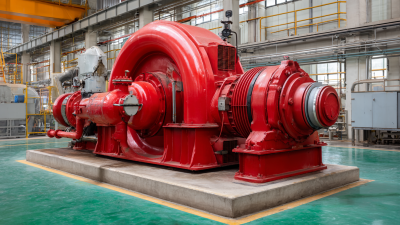In an era where sustainable water management is becoming increasingly critical, the adoption of innovative technologies is essential for achieving efficiency and environmental responsibility. One such technology is the Low Noise Pump, which stands out not only for its operational effectiveness but also for its ability to minimize the ecological footprint of water management systems.

This article delves into the myriad benefits of Low Noise Pumps, exploring how they can transform water management practices, promote sustainability, and support the transition towards greener infrastructure. By integrating these advanced systems, communities can better safeguard their water resources while fostering a more harmonious relationship with the environment.
Low noise pumps have emerged as a significant innovation in sustainable water management, combining efficiency with acoustic comfort. One of the key features of these pumps is their advanced engineering which minimizes operational noise, making them ideal for residential and rural areas where tranquility is essential. The incorporation of sound-dampening materials and advanced design techniques not only reduces sound levels but also enhances the overall performance of the pump. This means users can enjoy a reliable water supply without the disruptive noise typically associated with conventional pumps.
In addition to their quiet operation, low noise pumps often boast energy-efficient technologies that contribute to sustainable water practices. Many of these pumps utilize variable speed drives, allowing them to adapt to varying water demand while consuming less energy. This efficiency translates to lower operational costs and a reduced carbon footprint, aligning perfectly with the goals of sustainable water management. Furthermore, their durability and long lifespan mean fewer replacements are needed, minimizing waste and lower environmental impact. Thus, low noise pumps play a crucial role in promoting a harmonious balance between water resource management and environmental stewardship.
This bar chart illustrates the various benefits of low noise pumps in sustainable water management. Each dimension represents a key advantage, showcasing the importance of energy efficiency, noise reduction, maintenance cost, longevity, and environmental impact. Low noise pumps play a crucial role in enhancing sustainability in water systems.
The environmental impact of low noise pumps in water systems is increasingly recognized as an essential factor in promoting sustainable water management. These pumps significantly reduce noise pollution, which can adversely affect both wildlife and humans, particularly in ecologically sensitive areas. By operating quietly, low noise pumps contribute to preserving the natural habitat of aquatic species and minimize disruptive sounds that can interfere with animal communication and behavior, thus fostering a healthier ecosystem.
Moreover, the efficient operation of low noise pumps can lead to reduced energy consumption compared to traditional pumps. Lower energy usage not only contributes to decreased greenhouse gas emissions but also supports the conservation of resources, making these pumps an environmentally friendly choice. Their ability to maintain optimal performance levels while minimizing disturbances underscores their value in modern water management strategies aimed at balancing the needs of human infrastructure with the preservation of natural environments. Through the integration of low noise technology, water systems can enhance their sustainability efforts, demonstrating a commitment to environmental stewardship.
Integrating low noise pumps into existing water management practices is essential for achieving both sustainability and community well-being. Traditional pumps often operate at decibel levels that can disrupt surrounding ecosystems and residential areas. According to the American Society of Civil Engineers (ASCE), noise pollution from these pumps contributes significantly to urban stress, making the transition to quieter alternatives imperative.
 Low noise pumps typically operate at sound levels under 60 dB, which not only minimizes environmental impact but also enhances the quality of life for nearby residents.
Low noise pumps typically operate at sound levels under 60 dB, which not only minimizes environmental impact but also enhances the quality of life for nearby residents.
Moreover, implementing low noise pump systems can lead to energy efficiency improvements. The U.S. Department of Energy reports that low noise pumps can reduce energy consumption by up to 30% compared to conventional pumps, which is critical for sustainable water management strategies. By integrating these pumps into established infrastructure, municipalities can effectively manage resources while adhering to regulatory standards for noise pollution and energy use. This not only promotes sustainability but also reinforces a commitment to modernizing aging water systems, ensuring they are equipped for present and future challenges.
 Low noise pumps are gaining recognition for their role in sustainable water management, particularly due to their cost-effectiveness over the long term. By operating more quietly than traditional pumps, these systems not only enhance user comfort but also reduce stress on aquatic ecosystems, leading to a healthier environment. The initial investment in low noise technology may be higher, but the decreased energy consumption and reduced maintenance costs can significantly offset this expense over their lifespan.
Low noise pumps are gaining recognition for their role in sustainable water management, particularly due to their cost-effectiveness over the long term. By operating more quietly than traditional pumps, these systems not only enhance user comfort but also reduce stress on aquatic ecosystems, leading to a healthier environment. The initial investment in low noise technology may be higher, but the decreased energy consumption and reduced maintenance costs can significantly offset this expense over their lifespan.
In addition to the direct financial benefits, low noise pumps contribute to a more sustainable operation. Their efficient design often leads to lower energy requirements, which can result in reduced carbon emissions. This aligns with global sustainability goals and helps organizations meet energy efficiency regulations. Moreover, by minimizing noise pollution, these pumps promote greater acceptance in residential and urban areas, enabling projects that would otherwise encounter public resistance. Thus, investing in low noise pump technology not only supports economic benefits but also underpins community engagement and environmental stewardship.
In both urban and rural settings, the implementation of low noise pumps can significantly enhance user experience while contributing to sustainable water management. In densely populated urban areas, where noise pollution is a common concern, low noise pumps provide a solution that minimizes disturbance to residents. These pumps operate quietly, ensuring that activities such as irrigation, wastewater management, and fire protection are carried out with minimal impact on the surrounding environment. The reduction in noise levels fosters a more pleasant living atmosphere, allowing residents to enjoy their homes without the incessant hum of traditional pumping systems.
In rural areas, where tranquility is often a valued aspect of life, low noise pumps facilitate efficient water management while protecting the peace of the natural environment. Farmers and landowners benefit from the quiet operation of these pumps during critical tasks like irrigation or livestock watering, allowing for unobtrusive agricultural practices. Furthermore, low noise pumps can also encourage sustainable practices, as their efficiency often correlates with reduced energy consumption. This benefit not only appeals to eco-conscious users but also supports community initiatives aimed at promoting sustainable water use, strengthening the bond between nature and everyday life.






